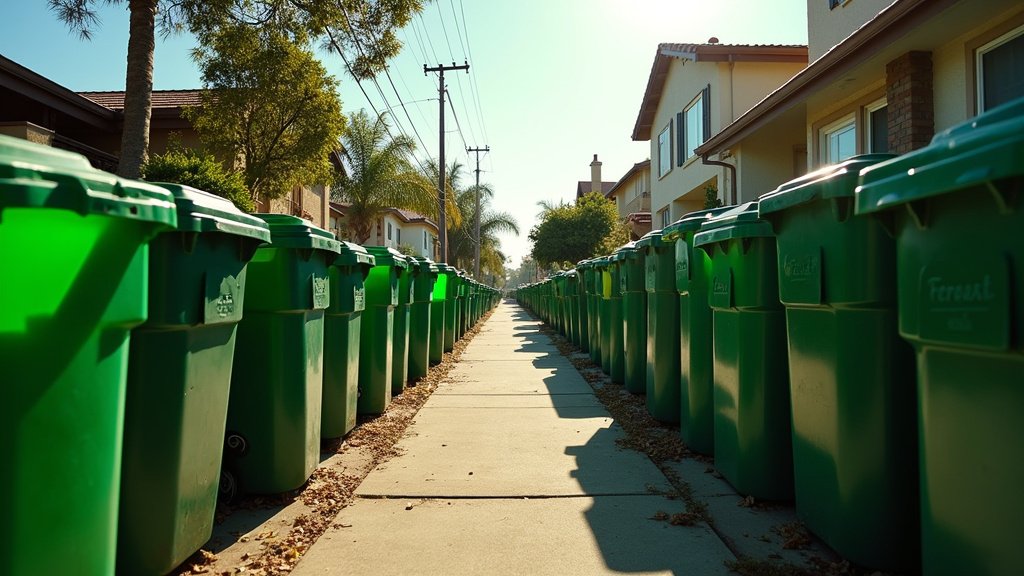Los Angeles Organics Program: Navigating a Green Bin Boom Amidst Organic Waste Mandates
Los Angeles residents are encountering a significant increase in green bins on their curbsides as the city diligently implements its comprehensive **LA Organics Program**. This program is a critical component of California’s ambitious Senate Bill 1383 (SB 1383), designed to substantially curb methane emissions by diverting organic waste from landfills. While the **LA Organics Program** promises substantial environmental gains, its rapid deployment has resulted in a noticeable proliferation of bins in neighborhoods, prompting both public inquiry and necessary adaptations. This initiative is central to the broader Los Angeles organics strategy.
Understanding the Organic Waste Mandate and the LA Organics Program
The driving force behind this widespread change is SB 1383, a law aimed at mitigating climate change by reducing short-lived climate pollutants, primarily methane, which is generated when organic materials decompose without oxygen in landfills. This legislation mandates a 75% reduction in statewide organic waste disposal by 2025 and requires all local governments to establish organic waste collection services. For Los Angeles, this translates to approximately 750,000 households now needing to separate food scraps and food-soiled paper, in addition to their usual yard waste, into their dedicated green bins. The **LA Organics Program** commenced citywide on January 18, 2023, following earlier pilot programs. The objectives extend beyond mere waste diversion and achieving **SB 1383 compliance** to include recovering at least 20% of edible food currently being discarded by 2025, thereby fulfilling the **organic waste mandate**.
Implementing the LA Organics Program: Citywide Challenges and Resident Adaptations
The transition to mandatory, citywide organics collection has presented both logistical and educational challenges for the **LA Organics Program**. The rollout, perceived by some as understated, means many residents are still adjusting to the new waste sorting protocols. To aid this transition, the Los Angeles Sanitation and Environment (LASAN) department is distributing complimentary 2-gallon kitchen pails to assist residents in collecting food scraps indoors before placing them in their green bins. For residents in multi-family dwellings, especially renters, the availability of green bins hinges on landlords coordinating with private waste haulers, as compliance with the state law is obligatory. The sheer volume of new bins on streets in certain areas has contributed to a perception of clutter, with one report highlighting a “glut of green bins” as part of this vital **waste diversion LA** effort.
Financial Implications: Addressing Trash Fee Increases for the LA Organics Program
The establishment and ongoing operation of such an extensive organics program incur significant expenses. Processing organic waste is considerably more costly than landfilling, with costs escalating from approximately $40-$60 per ton to as much as $110-$120 per ton. This surge, combined with general inflation affecting labor and equipment, and a historical dependence on general fund subsidies for the sanitation bureau (amounting to hundreds of millions of dollars annually), has necessitated adjustments to solid waste fees. For the first time in 17 years, residents in single-family homes and small apartment buildings (three to four units) are facing notable **trash fee increases**, with monthly bills projected to rise to $55.95. These changes are designed to ensure the **LA Organics Program** achieves full cost recovery and to alleviate pressure on the city’s general fund, thereby supporting the **LASAN organics** initiative.
Environmental Goals and the Future of the LA Organics Program
Despite initial hurdles and the necessary financial adjustments, the **LA Organics Program** is indispensable for Los Angeles to meet its environmental responsibilities. By diverting organic waste from landfills, the city aims to drastically reduce its greenhouse gas emissions and contribute positively to global environmental health. The city has also secured substantial contracts, totaling up to $1.67 billion over 15 years, with waste management firms for the processing of collected organic materials. LASAN is targeting the collection of approximately 3,000 tons of commingled organic material daily, a significant increase from current volumes, reinforcing the objectives of the **green bin program**. Enforcement measures are in place, with potential penalties for non-compliance set to begin in 2024, emphasizing the gravity of the state mandate and the critical role of the **LA Organics Program**.
The successful integration of the **LA Organics Program** into the daily routines of Los Angeles residents will necessitate continuous public education and ongoing adaptation. The program’s ultimate success will be evaluated not only by compliance rates and diverted tonnage but also by its capacity to cultivate a sustainable waste management culture throughout the vast metropolis. This particular focus on Los Angeles’ endeavors highlights the intricate relationship between environmental policy, municipal services, and resident engagement in tackling the worldwide challenge of waste reduction. This news underscores the city’s commitment to environmental stewardship amidst evolving regulations and economic pressures, positioning the **LA Organics Program** as a key element of its sustainable future.





